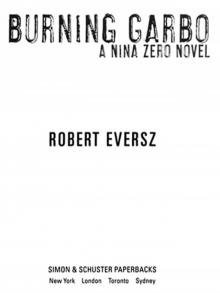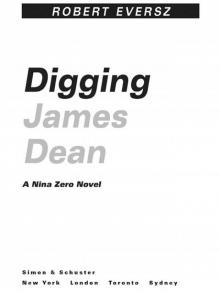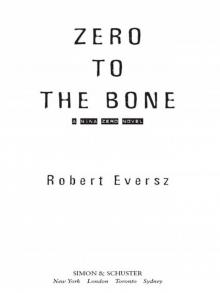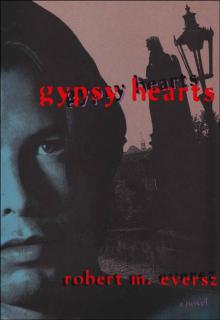- Home
- Robert Eversz
Gypsy Hearts Page 2
Gypsy Hearts Read online
Page 2
“Sure, but on any night of the week you can find over twenty types of Czech beer. You have to consider what’s most important in life.”
“I hate beer!”
Heresy! Shouting such a sentiment in Prague was the Czech equivalent of condemning apple pie in Washington.
“I’m tired of drinking too much and waking up the next morning with a hangover and some woman I can’t remember meeting the night before. It’s an empty, stupid lifestyle.”
Andrew’s behavior was little different from that of most young Americans in Prague. He smoked and drank to excess. He lived for the favors of sequential lovers. For the first time in his young life, he lived more than one hundred miles distant from his family. Familial conscience had faded to a crackling voice on the telephone. He had no friends from home. No family priest. No school. No government. No one was watching. Nothing was forbidden. God doesn’t punish what God doesn’t see. My God, who had never been the most omniscient deity to begin with, bailed out over the Atlantic or was, perhaps, discreetly pushed.
“I’m thinking of leaving Prague,” Andrew confessed.
“Don’t be such a whiner,” I counseled. “If you go back to the States, you’ll be crying within a month because not only will you be stuck in some stupid job, you won’t be able to afford to drink and no one will want to sleep with you.”
Andrew with great concentration bit a loose flap from the cuticle of his thumb. “I wasn’t thinking of going back to the States, at least not right away.”
“You can’t afford Paris,” I said.
“A refugee camp just opened in the countryside. For Yugoslavs, mostly Bosnians. I thought I’d go there for the summer, teach English to the kids.”
My grin spread unconstrained. Though I felt the occasional wild impulse to do good, I never considered acting on it. The nobler sentiments of altruism and charity seemed irrelevant to the demands of the modern world.
“What’s happening in Yugoslavia is terrible,” Andrew insisted. “We should do something about it. Maybe teaching English isn’t enough, but it’s better than turning a blind eye.”
“Hey, look everybody!” I shouted. “It’s Mother Teresa with a penis!”
My jibe seemed appropriate and clever, and I couldn’t stop myself from laughing out loud. It was then that Andrew hit me a childish blow, the flat of his hand across my jaw. I stared at him in disbelief. He said, “You’re such an asshole.”
“Certainly you don’t—I mean, Andrew, please,” I stuttered.
He pulled violently away from the table, grabbed his guitar case, and fled. I expected someone to rally to my defense, to approach with a commiserating word or hand. Neither came. I’d been told before that contrary to my initial charm I’m not a very likable person. I flagged a passing waiter and ordered six shots of Johnnie Walker. I’m good at first impressions. I practiced introductions for months in the first sallow bloom of my youth. Stood in front of a mirror and grinned, testing blends of sincerity, intelligence, and emotional warmth, with a dash of devil-may-care for spice. The icebreaker first, the clever little tale that always gets the smile. Indeed, Nix is an unusual name, and there’s an interesting story behind. … Say just enough to impress, hinting modestly at important matters not at liberty to be discussed. Feign understanding and interest. Sparkle. Move on, before the conversation bores to distraction and the undisciplined truth slips out. I’ve since learned tricks to keep the deception going. Some people have known me for years and have yet to discover anything genuine about my character. But I weaken at times, from greed for human companionship. I can be fooled by the ruse of friendship. My attempts at intimacy have always met a bitter and lachrymal end. Apparently, the more skins peeled from the atrophied onion of my heart, the more pungent the odor.
The waiter returned with my drinks. I lined the glasses straight, knocked the first shot back, and noted the time on my watch. Nothing to be ashamed of, my feeling wounded. Even a monster has feelings. King Kong fell for Fay Wray. The Hunchback of Notre Dame burned for Esmeralda. And who was more human than Frankenstein, struggling to fill with blood and broken bones the emptiness in his newly wrought soul? Rarely is the monster appreciated. Five minutes later, I tossed down the second shot. Perhaps Andrew hadn’t meant it, not really. It wouldn’t have depressed me, had I not loved him. Loved wasn’t the right word. Love was an empty sentiment. The brotherly bond of an older brother? Avuncular affection? Unrecognized homoerotic longing? I considered distant synonyms for love and failed to find one adequate to the situation. I glanced at my watch and emptied the third shot. I was more capable of murder than love. The murderer is a creation of genetics and chance, and as blameless as any predatory creature acting according to its character. May as well blame Lucifer for being a devil. A brilliant thought, really, the monster as victim. You have been chosen, willing or not, to … After the fourth shot, my thoughts wouldn’t hold still or, rather, I lacked the intellectual time-space coordination to grasp them. The whisky hit after the fifth shot, unscrewing my head at the neck. I can’t remember drinking the sixth.
Sometime later I tried to chase down my head, which had risen from my shoulders and drifted above the dance floor. I lurched into the crowd and blindly groped the space where I thought my cranium should be. A woman bared her teeth in laughter, thinking my frantic search a new dance craze from the West. I shouted something I can’t recall. An unfortunate elbow sharply reminded me of unsettled matters in my stomach, which insisted on prompt exposure. I glanced wildly about for the bathroom. It lay at the bottom of a steep stairway. Not enough time or physical coordination. I pushed my way toward the railing. The crowd didn’t willingly yield passage. I was jostled, sung to, pushed, and danced around. A raised cobblestone or inadvertent foot tripped me up, and I sprawled onto my hands and knees near a table at the edge of the crowd. The choice of time and place was no longer mine. A dog on all fours vomits where the urge takes it, on the master’s white carpet or not.
“You disgusting man!” a woman shouted at me, her English accented by a barbaric tongue. I looked up to a face as cruel and sensual as the illegitimate spawn of Brigitte Bardot and Genghis Khan. I felt a violent thumping in my chest and wondered why my heart should knock about so fiercely, then noticed the thumps coincided with the vomit-splattered tip of her shoe slamming into my rib cage.
“Get away from me, you disgusting man!” The woman commanded, her blows like those of the horsewoman falling onto the indifferent ribs of a beast. She raised her heel and gave me the thrust of it. I rolled onto my back. She towered above, gloriously enraged. I laughed. She understood! Most women would have shrieked at a man spilling his guts at their feet, but not her. She instinctively understood I was disgusting, loathsome, vile. I was a beast, to be beaten and kicked into submission. An odd idea speared my brain and fixed it like a lump of meat awaiting the spit. If she could come to love me, intuitively knowing my true character, then perhaps I might be redeemed. The next evening, I would present her with my charming self, the dashing, considerate, and intelligent man many women found irresistible. She would know immediately I was a fake. But what type of fake? Might not the mystery intrigue her? I could charm her intuition to sweet sleep, and, like so many others, she might believe I was the gentleman I pretended to be. Later, when conscious knowledge of my true monstrousness met her initial instincts, love and loathing might find balance in understanding.
I crawled home stained and soiled but exhilarated by unreasoning hope. To vomit on a woman one night and win her heart the next was absurd. At most, I could expect a strained acceptance of my apology. But I felt certain I could succeed. I would bring her a dozen red roses—no, three dozen. I would scribe some witty bon mot on a napkin, order a bottle of champagne delivered to her table, and patiently wait for her reply. When she first discovered the generous gentleman to be the vomiting fool from the night before, she would certainly ask my name, accept my offer to sit and share a drink or two. Such a display of style and grace would soften her
heart. She would have no choice but to fall in love.
3
I staggered to my feet just after dawn, head pounding in syncopation with violent knocking at the door. Memories from the previous night floated in the wreckage of my hangover. Andrew. Six shots of Scotch. Rude kicks to my rib cage. The vomit-flecked pumps of an enraged goddess. Curses tumbled past my teeth. How could I have been so stupid? I swung the door open to a pair of State Policemen, one dangling an arrest warrant and the other drawing a bead on my forehead with the barrel of his Walther P-38.
“Up against the wall, American schweinhund!” One commanded, shoving me into the hallway.
“You can’t do this! I’m an American citizen!” I protested.
A fist slammed into my kidney.
“You’re not in America anymore,” he sneered.
“Capitalist exploiter of the heroic masses,” the other taunted.
I felt the brutal tip of the P-38 press against the temporal bone behind my right ear and rued the day I accepted a package from that shadowy figure from the CIA who appealed to my sense of patriotism and duty to country. …
An inspired fiction, of course, springing into my imagination the moment I put my eye to the peephole and spied two policemen in the hall outside my door. I have a talent for sudden paranoid fantasy, enriched by the vast repertoire of scenes from my years studying movies and television. The two policemen who appeared that morning were far more terrified of me than I of them. One presented an official-looking form while the other hid behind his back, as though I might, if offended, resume the Cold War and so return the country to Soviet hegemony.
“I don’t read or speak Czech. If you have a problem, talk to the American Embassy,” I suggested, and closed the door.
Two minutes later, the policemen mustered the courage to knock again. In the meantime, I had artfully lathered my face with shaving cream to demonstrate complete indifference to their visit. I snapped open the door.
“Please, I have an appointment. I told you to contact the American Embassy if you have any problems. I have many friends in the American Embassy. I’m sure my friends in the American Embassy can handle this.” I was certain that, like trained dogs, they understood only a few key words, two being “American” and “Embassy.”
One’s hand braced against the door when I attempted to swing it shut. “You come,” he commanded.
I gave my most scathing look to the back of his hand, which failed to convince him to remove it from my door.
“Am I to understand that I’m under arrest?” I asked.
He rattled the form in front of me and repeated, “You come.”
The man seemed determined to carry out his job. I considered conflict escalation as the more entertaining alternative to conflict resolution. I could push him backward, slam and lock the door. They wouldn’t break down the door to get me. Later, I could claim it was a misunderstanding.
“Very well. I need five minutes,” I said, holding up five digits, then pointing to the shaving cream on my face.
One’s hand dropped away from the door. I repeated the words “five minutes” several times, flashing my fingers in the space between the closing door and the jamb. One stepped reluctantly back. When the lock clicked into place, I sprang the dead bolt. Done. It would take a bomb to get through that door. I ran water in the sink and proceeded to shave, admiring the steadiness of my hand on the razor. After rinsing, I wandered into the living room, a towel pressed against my chin to staunch the flow from a few small cuts, and estimated the drop out the back window. I lived two floors up in a courtyard apartment. The courtyard was littered with broken beer bottles, rusted piping, molding carpet, shredded cardboard, and the desiccating corpses of various small mammals. The average communist and the white-trash American have at least this much in common: Both are too cheap to discard anything of possible value and too lazy to dispose of the completely worthless. Assuming the jump didn’t break my ankle, I could walk unscathed out the front door of the apartment building.
I selected from the closet charcoal-gray slacks, a white shirt custom tailored to my specifications, Canali silk tie, and Armani checked sport coat. It was important to dress well when conducting any official business in what was then Czechoslovakia. The Czechs had lived so long in a classless society, while secretly longing for its opposite, that any presentation of wealth and style intimidated them witless. If the State Police wanted to ask me a few questions, I would accommodate them with answers of my own choosing. It made little sense to run from a powerless adversary. Perhaps I could even learn something to work into a future screenplay.
It was a dismal spring day, gray and wet. With a few thumps on the dashboard, the driver convinced the wipers to streak across the windshield. I had expected to be taken to the police station in a Tatra, the ominously black trademark car of the Czech secret police, but my two policemen drove a proletarian Škoda. In Czech, škoda is both proper and common noun. As a common noun, škoda means “pity.” Escorted up the steps to police headquarters, I pitied how low the minions of Czech law and order had fallen. I was led through a bewildering set of corridors, sat on a bench, and made to wait.
A half hour later, the door to my left opened. My guards ushered me into a small office, where two men casually ignored my entrance, one to study a file folder on his desk and the other occupied by the rain falling beyond the window. The man behind the desk wore a cheap brown suit. On a salary equivalent to two hundred dollars a month, the suit was a sign of honesty. Its ugliness was a matter of personal choice. He gestured toward the chair, a sound like the dry grind of a garbage disposal in his throat.
“I don’t speak Czech,” I said, sitting. “If you wish to interview me, it will have to be in English.”
“Passport, please,” he said.
I handed over my passport and watched him study its pages. I sniffed a reek of cigarettes and poor personal hygiene. The random angled spray of hair indicated his barber was a talentless disciple of Picasso and Braque. His face was all lopsided smudges of gray and pink, held into bare coherence by dark and rheumy spots on opposite sides of the lump that served as his nose. Likely broken a few times and never set right. I judged him a man who would consider timidity a weakness.
“Now that you know who I am, I would like to know who you are,” I said.
The man glanced up from his study of my passport, startled by my voice. His pouched eyes were apologetic. He either hadn’t heard or didn’t understand.
“Who are you? Your name,” I said, as slowly and clearly as possible.
He searched the clutter on his desk and uncovered a nameplate hidden between a stained coffee cup, a dead spider plant, and a stack of file folders. The other man had not moved since my entrance. He dressed like an American—tennis shoes, off-brand blue jeans, lumpy sweatshirt, windbreaker. I wondered if he watched the sky, raindrops roll down the window, or my reflection in the glass. The man behind the desk set my passport aside and opened the top folder on his stack.
“Problems, Mr. Miller. We have problems with you.” He sighed.
I read the name on the plate—Petr Zima—and assumed the jam of consonants before the name was a title of some sort.
“I’m deeply distressed to hear that, Mr. Zima. I also have a problem. With the Gestapo tactic of sending two policemen to abduct me from my apartment on a Sunday morning.”
“I read in your passport you are here three months now. It would not hurt to learn some Czech.”
I laughed at the absurdity of his suggestion. Learn Czech! Learn a language with seven incomprehensible grammatical cases in a country of sixteen million impoverished creatures! I said, “This is a very small country in an English-speaking world. I don’t think it’s reasonable to ask the world to speak your language. You should all speak English.”
“Learn English or die, as the expression goes in my country,” the man at the window carefully pronounced, his eyes fixed on the glass.
“It isn’t a question of life or
death, but of being irrelevant.”
“Irrelevance is the same as death to a small country.”
“Do you have some official capacity here, or are you employed to stare out the window and utter profundities?” I asked.
“He is my colleague, from Mad’arsko,” Zima answered.
“Where the hell is that?”
“Hungary, in English. I’m from Budapest,” the man declared, and turned at last to face me. His was the darkness of the Hun who once raged down from the Mongolian plains to plunder Europe. His eyes had no light in them at all, as if the pupil of each had swallowed the iris whole. He introduced himself as István Bortnyk. He said he was a cop, using the American idiom, and attended the interrogation to observe Czech legal procedure. An obvious lie. I wondered what a detective from Budapest could want with me.
“I am very sorry to disturb you on beautiful and sunny Sunday, Mr. Miller,” Zima pronounced with careful irony. “But I hear complaints, and it is my job, whether I like it or not, to look into complaints. To ask questions, take notes, and apologize if complaints are not correct. This is why I ask you to come.” He shuffled through the file folders on his desk and opened what I presumed to be mine. He read, nodding his head at one passage, shaking his head at another, until a final wince testified to a telling blow against my character. Still, his voice managed to register surprise when he announced, “I have reports here from several young women. All say they go to café or club, meet you, and same night their wallet is stolen. It’s too much for coincidence, I think.”

 Burning Garbo
Burning Garbo Digging James Dean
Digging James Dean Zero to the Bone
Zero to the Bone Gypsy Hearts
Gypsy Hearts